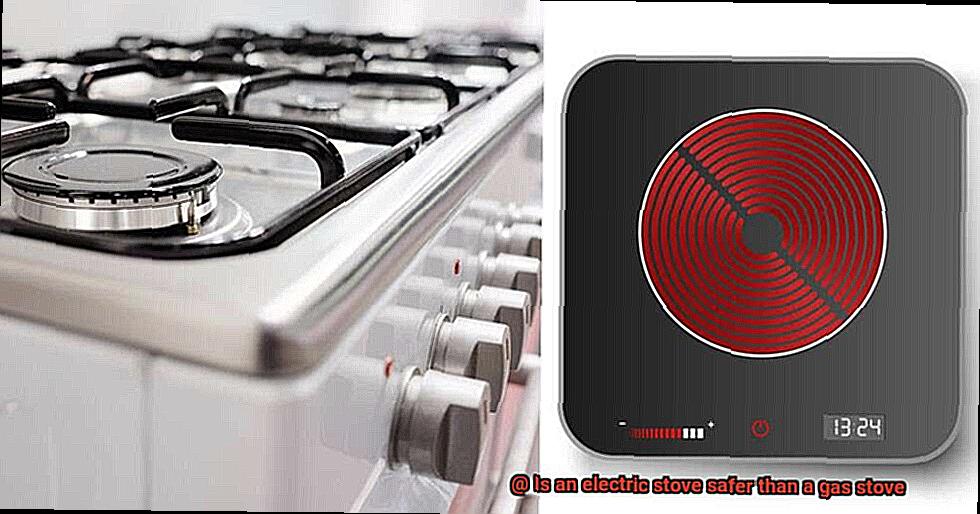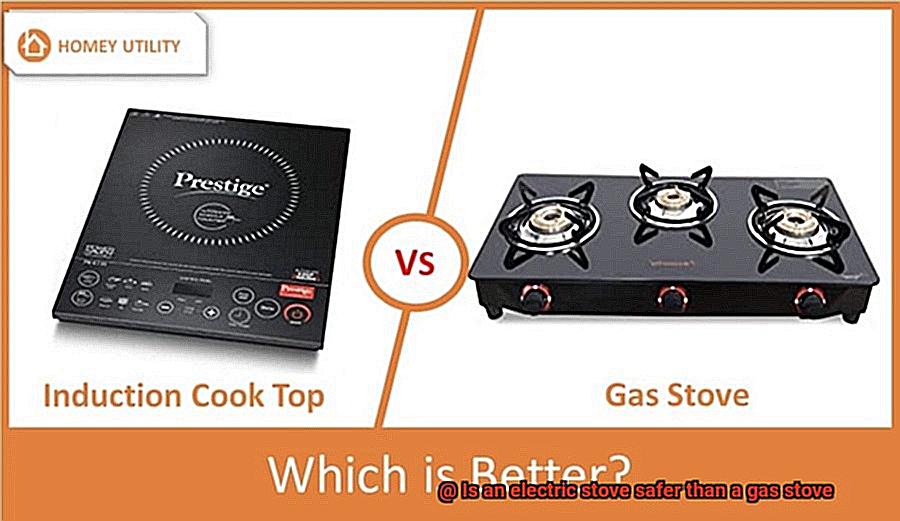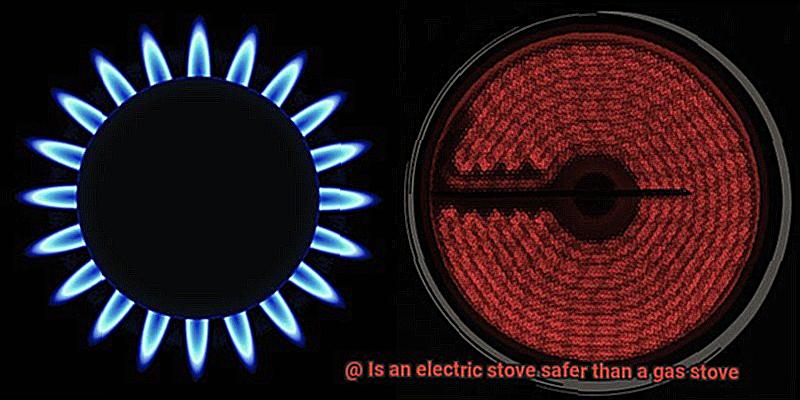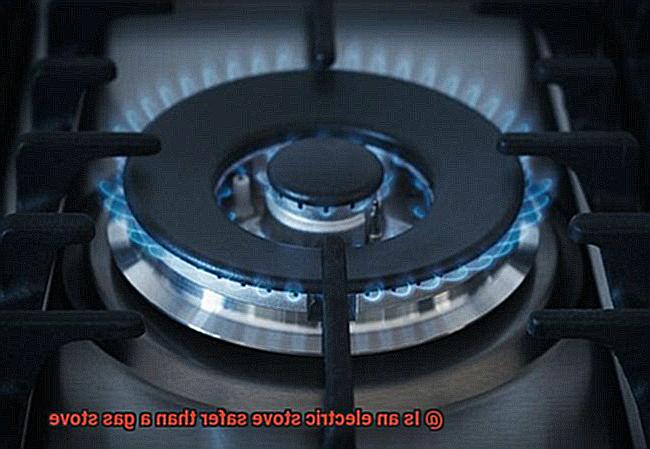Do you consider yourself a culinary enthusiast who spends countless hours in the kitchen? If so, you’ve likely pondered which cooking appliance is safer – an electric or gas stove. Don’t fret if you’re uncertain about which option to choose because we’ve got you covered. In this blog post, we’ll dive into everything you need to know about electric and gas stoves and determine which one reigns supreme in terms of safety.
Cooking is a daily necessity that provides endless joy, but it can also pose potential safety hazards. Electric and gas stoves have their respective benefits and drawbacks, from energy efficiency and cost-effectiveness to cooking performance and heat control. However, when it comes to safety, it’s crucial to understand which option is best for you and your loved ones.
Our blog post will explore the primary differences between electric and gas stoves, including their unique safety features, risks, and maintenance requirements. We’ll also address common safety concerns related to cooking such as overheating, gas leaks, electrical shocks, and fires. Whether you’re a beginner cook or seasoned chef – keep reading to uncover whether an electric stove is indeed safer than a gas stove.
Contents
Safety Considerations for Gas Stoves
Gas stoves have been a kitchen staple for years, but their use comes with some safety considerations that should not be taken lightly. One of the most significant risks associated with gas stoves is the potential for gas leaks or explosions. If there is a malfunction or improper installation, gas can build up inside the house, leading to an explosion. To prevent this from happening, homeowners should schedule regular maintenance and inspections of their gas stove and gas line.
Another risk to consider is the potential for burns from open flames. Gas stoves use an open flame to heat cookware, which can be extremely dangerous if not used properly. Leaving pots or pans unattended on a gas stove can cause fires or serious burns. To reduce this risk, always use appropriate cookware and never leave pots or pans unattended on the stove.
Furthermore, gas stoves emit carbon monoxide when they burn, which is a colorless and odorless gas that can be deadly if inhaled in large quantities. Proper ventilation in the kitchen is crucial to prevent carbon monoxide buildup. Homeowners should ensure that their kitchen has adequate ventilation to avoid this risk.
To reduce the risks associated with gas stoves, homeowners can take several steps. Regular maintenance and inspections of the gas stove and gas line are essential to prevent malfunctions or leaks. Additionally, using appropriate cookware and never leaving pots or pans unattended on the stove can reduce the risk of burns and fires. Finally, ensuring proper ventilation in the kitchen is crucial to prevent carbon monoxide buildup.
For those who are concerned about the safety of gas stoves, electric stoves are an alternative option. Electric stoves do not produce any gas emissions and are generally considered safer in terms of fire risk. However, they also come with their own set of safety considerations, such as the risk of electrical shock.
Safety Considerations for Electric Stoves
If you’re in the market for a new stove, safety should be one of your top priorities. Electric stoves are an excellent option for safety-conscious individuals, as they lack the open flame that’s present in gas stoves. This means that there’s less risk of burns or fires caused by sparks or flames. Additionally, many electric stoves come with automatic shut-off switches that turn the stove off in case of overheating or if a pot boils over, which helps prevent accidents and damage to your kitchen.
However, it’s important to note that not all electric stoves come with these safety features. Therefore, it’s crucial to do your research before making a purchase and prioritize models that offer these types of safeguards. While it may cost a bit more upfront, the added peace of mind is well worth it.
Another safety consideration for electric stoves is the potential for electrical shock. To avoid this risk, make sure that your stove is installed properly and that the wiring is up to code. Keeping your stove and its components clean and dry also helps prevent any electrical malfunctions.
Apart from the above considerations, here are some other things to keep in mind when using an electric stove:
- Follow proper cooking guidelines to avoid burns or fires.
- Keep flammable materials away from the stove.
- Ensure that your stove is properly maintained and installed.
Factors to Consider When Choosing Between a Gas and Electric Stove
Cooking is an essential part of our daily lives, and it all starts with choosing the right stove. However, the overwhelming decision to choose between a gas or electric stove can be daunting. Safety is a top priority when considering this decision, as it could have serious consequences if not taken into account.
When choosing between a gas and electric stove, it’s essential to consider safety factors carefully. Gas stoves have an open flame that could potentially cause fires or explosions if not handled correctly. Furthermore, gas leaks can occur if the stove is not installed or maintained properly, posing a significant safety risk. To mitigate these risks, ensure that your gas stove is clean and that the gas connections are secure. It’s also crucial to invest in a carbon monoxide detector to detect any leaks.
On the other hand, electric stoves do not have an open flame, making them less prone to fire risks than gas stoves. Though, they can become extremely hot during use and pose burn risks if touched or if flammable objects are placed too close to them. Additionally, electric stoves can malfunction or short circuit, which could also pose a safety risk. Therefore, automatic shut-off switches on the stove are essential in case of overheating.
When considering safety as a factor in choosing between a gas and electric stove, it’s important to weigh the specific risks and benefits of each type against your individual needs and preferences. If you have children or pets, an electric stove with an automatic shut-off feature might be more suitable for your household. However, if you’re an avid cook who enjoys the precision and flexibility of cooking with gas, then a gas stove might be your best option.
Advantages of an Electric Stove Over a Gas Stove
It may be time to consider an electric stove over a gas stove. As an expert on the subject, I can confidently say that electric stoves offer significant advantages that make them a great choice for any kitchen.
First and foremost, electric stoves are safer than gas stoves. With no open flame to worry about, there is a reduced risk of fires and gas leaks. Additionally, most electric stoves come equipped with automatic shut-off systems that turn off the stove if it overheats or if there is a short circuit. This feature provides peace of mind for those who prioritize safety in their homes.
Another advantage of electric stoves is their easy-to-clean surface. Unlike gas stoves with burners and grates, electric stoves have a smooth surface that can be wiped down with a damp cloth. And spills are less likely to become burnt-on and difficult to remove. This means less time spent scrubbing and more time enjoying a clean kitchen.
Those who love cooking delicate dishes will appreciate the precise temperature control that electric stoves offer. With digital controls, you can set the exact temperature you need, ensuring that your food is cooked perfectly every time. This feature also makes it easier to maintain consistent heat throughout the cooking process.
Electric stoves are also more energy-efficient than gas stoves. They convert more of the energy they use into heat, resulting in lower heating costs over time. Additionally, they do not require a pilot light burning continuously, which wastes energy when not in use. This makes them a more eco-friendly option for those looking to reduce their carbon footprint.
Finally, electric stoves are typically less expensive to purchase and maintain than gas stoves. They do not require professional installation or regular maintenance like gas stoves do. This means more money saved in the long run for those who prioritize affordability in their household appliances.
Disadvantages of an Electric Stove Compared to a Gas Stove
While they are often considered safer and more affordable, they do have some drawbacks that should not be ignored.
The first disadvantage is the time it takes for electric stovetops to heat up and cool down. Unlike gas stovetops that heat up instantly, electric stovetops take longer to reach the desired temperature. This can be frustrating when you need to quickly adjust the heat or cook something that requires precise temperature control.
Another disadvantage of electric stoves is their lack of responsiveness. Adjusting the temperature on an electric stove takes time to register, which can lead to overcooking or burning your food. In contrast, gas stoves offer instant heat adjustment with a simple turn of the knob.
Electric stoves are also generally more expensive to operate than gas stoves. The cost of electricity is usually higher than gas in most areas, which means that your energy bills will likely be higher if you use an electric stove.
Lastly, electric stovetops tend to be less efficient than gas stovetops. Gas flames heat cookware directly, which means less heat is lost during the cooking process. Electric stovetops rely on radiant heat from a heating element, which can result in more heat loss and longer cooking times.
Despite these disadvantages, electric stoves still have their advantages. They are easier to clean and maintain than gas stoves and offer precise temperature control. Additionally, they produce fewer greenhouse gases, which makes them better for the environment.
Potential Hazards of Using an Electric or Gas Stove

It is crucial to be aware of these risks to ensure the safety of yourself and those around you while cooking up a storm in the kitchen.
Electric stoves may seem like the safer option since they don’t use gas, but they too have their own set of hazards. The heating elements can become dangerously hot, posing a risk of burns if anyone comes into contact with them. Additionally, faulty wiring or improper grounding can lead to electrical shocks that can be fatal.
Gas stoves, on the other hand, present a more obvious danger – the risk of fire and carbon monoxide poisoning. Gas leaks can cause explosions or fires, while inadequate ventilation can lead to the release of carbon monoxide. This colorless and odorless gas can have severe health consequences if inhaled, including headaches, nausea, dizziness, and in serious cases, even death.
To minimize these risks, it is important to take proper safety precautions. For electric stoves, make sure the stove is properly grounded and keep flammable materials far away from the stove. When using gas stoves, ensure proper ventilation and regularly check for gas leaks. It is also important to have carbon monoxide detectors installed in your home to provide an early warning system.

Here are some other safety tips when using electric or gas stoves:
- Never leave your stove unattended while cooking.
- Keep pot handles turned inward to avoid accidentally knocking them over.
- Use pots and pans that are appropriate for your stove’s size and heating element.
- Regularly clean your stove to avoid grease buildup that can ignite.
- Have a fire extinguisher nearby and know how to use it in case of an emergency.

Tips for Safely Using a Gas or Electric Stove
Cooking is an enjoyable and delicious way to spend time in the kitchen, but it can also be dangerous if safety measures are not taken into consideration. Whether you’re using a gas or electric stove, there are some essential safety precautions that you should follow to ensure that you’re cooking safely.
Check for gas leaks
If you’re using a gas stove, it’s important to check for gas leaks before turning on the stove. The smell of gas or a gas leak detector can help you detect any leaks. Gas leaks can lead to fires or explosions that can result in serious injury or even death.
Keep flammable objects away
It’s essential to keep flammable objects such as towels and curtains away from the stove while it’s in use. Even a small spark can lead to a fire that can quickly get out of control.
Keep the stove clean
If you’re using an electric stove, make sure to keep it clean and free of any spills or debris. This will help prevent any electrical shorts or fires from occurring. Regular cleaning of your stove will prolong its lifespan and prevent malfunctions.
Use compatible cookware
Using the wrong type of cookware can damage your stove and cause safety hazards. When using an electric stove, make sure to only use cookware that is compatible with your specific type of stove. Using pots and pans with flat bottoms and in good condition can prevent scratches or damage to the stove’s surface.
Never leave the stove unattended
Regardless of whether you’re using a gas or electric stove, it’s important never to leave the stove unattended while it’s in use. This can help prevent accidents from occurring, such as fires or burns. It’s always better to stay close to the stove while cooking and avoid multitasking in the kitchen.
6L5nNCOhxpY” >
Also Read: Report Shows Electric Stoves Are More Dangerous Than Gas
Conclusion
In conclusion, the debate over whether electric or gas stoves are safer ultimately depends on your individual needs and preferences. While gas stoves present the risk of gas leaks, fires, and carbon monoxide poisoning, electric stoves can pose the risk of burns and electrical shocks. However, with proper maintenance and precautions, these risks can be minimized.
When it comes to safety, electric stoves have a clear advantage over their gas counterparts due to their lack of open flame and automatic shut-off features. This makes them an ideal choice for those who prioritize safety above all else. On the other hand, if you’re a passionate cook who values precision and flexibility in your cooking methods, then a gas stove might be more suitable for you.
Regardless of which type of stove you choose, it’s important to follow essential safety precautions such as checking for gas leaks regularly, keeping flammable objects away from the stove while in use, using compatible cookware that won’t scratch or damage the surface of your stove top, keeping the stove clean and free from debris that could cause a fire hazard. Additionally, never leave your stove unattended while in use to avoid any potential accidents.
In summary, both electric and gas stoves have their pros and cons when it comes to safety. The key is to weigh up these factors against your individual needs before making a decision.






